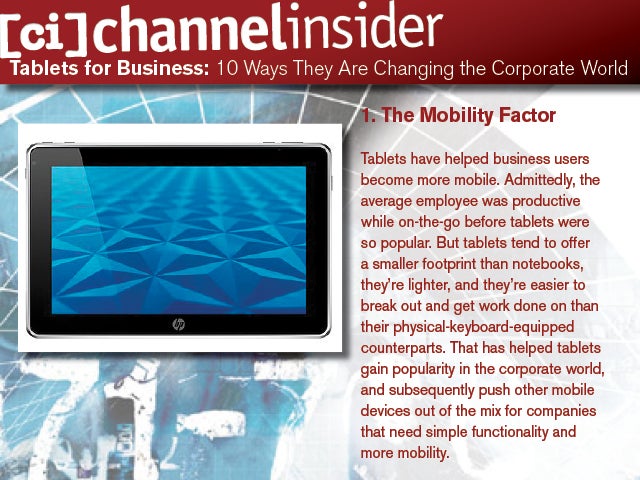 1. The Mobility Factor
1. The Mobility Factor
Tablets have helped business users become more mobile. Admittedly, the average employee was productive while on-the-go before tablets were so popular. But tablets tend to offer a smaller footprint than notebooks, they’re lighter, and they’re easier to break out and get work done on than their physical-keyboard-equipped counterparts. That has helped tablets gain popularity in the corporate world, and subsequently push other mobile devices out of the mix for companies that need simple functionality and more mobility.
 2. The Death of Netbooks
2. The Death of Netbooks
Tablets have almost single-handedly killed netbooks. Back in 2009, netbooks were all the rage in the enterprise, and most believed they would be around indefinitely. But then tablets came along and changed all that. Now, netbooks look like the also-ran in the enterprise-computing market.
 3. Less Reliance Upon Notebooks
3. Less Reliance Upon Notebooks
As mentioned, the ability for tablets to make employees more mobile has proven useful in their battle against netbooks. But that element is also helping companies think twice about notebooks. After all, why buy a lightweight, small notebook when a tablet can be purchased for about the same price, if not less, and deliver a more employee-friendly experience. It’s both a matter of money-savings and employee happiness that makes tablets a better idea than notebooks in many cases.
 4. Changing PC Adoption Cycles
4. Changing PC Adoption Cycles
Tablets are effectively changing the way companies decide to acquire computers. Previously, when a person had an outdated notebook, it was time to give them something else. But with the help of new tablets, companies are realizing that they can extend the life cycle of an outdated notebook for employees that need to perform more basic tasks, like document editing, research on the Internet, and answering e-mail. It’s an interesting shift, and it’s one that the enterprise is capitalizing on.
 5. Bringing Apple In
5. Bringing Apple In
Apple’s iPad has been an absolute success in the tablet market. And it has proven that tablets can appeal to corporate customers. Realizing that, Apple has been able to gain ground in a space — the enterprise — that it hasn’t enjoyed the best track-record with. It’s an interesting change in the way the corporate world views Apple. And both stakeholders are benefiting greatly from it.
 6. Bringing Google In
6. Bringing Google In
If Apple is gaining more importance in the enterprise because of its tablets, it’s quite possible that Google might see the same result as more companies start offering its mobile operating system in their tablets. One of the most compelling enterprise-focused tablets coming later this year is the Cisco Cius. That device will integrate with existing Cisco infrastructure. It will be running Android.
 7. Reducing Microsoft’s Influence
7. Reducing Microsoft’s Influence
More iOS- and Android-based devices are entering the corporate world than ever before. And in the process, they’re supplanting Windows-based products. Does that mean Apple and Google will be more important than Microsoft in the enterprise? Not a chance. But they’re proving that Microsoft can be overcome, to some extent.
 8. A More Consumer-Friendly Enterprise?
8. A More Consumer-Friendly Enterprise?
With the adoption of tablets and even touch-screen-based smartphones, it’s becoming clear that the enterprise is becoming more consumer-friendly than it ever has been. Some companies are even lettering employees buy their own smartphone or tablet and use it for work purposes. And in many of those cases, employees are choosing iPhones and iPads. It’s an interesting shift. And it’s one that’s making the enterprise more consumer-savvy than ever before.
 9. How Do Smartphones Stack Up?
9. How Do Smartphones Stack Up?
Considering the iPad and Android-based tablets feature the same operating system as their smartphone counterparts, and in many cases those operating systems work better than BlackBerry OS, companies are starting to rethink their smartphone needs. it makes sense. If a tablet delivers the same functionality as a tablet except for calling, is it better to get a new tablet and stick with older smartphones? Or perhaps more importantly, is both a smartphone and tablet needed? It’s something that companies are thinking more and more about.
 10. Rethinking Employee Needs
10. Rethinking Employee Needs
When it’s all said and done, tablets afford companies more opportunities to determine what employees really need. As mentioned in previous slides, they sometimes reduce the need for PCs or smartphones. They can also play a role in budgetary decisions. And along the way, they are considered an alternative option for employees that don’t need all the extras that, say, a desktop would offer. Simply put, tablets are changing the way IT decision-makers think.

